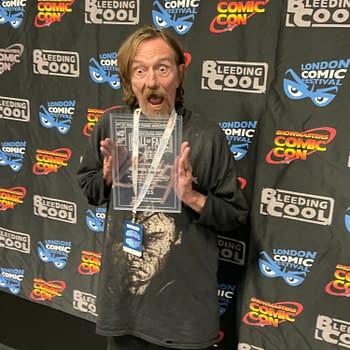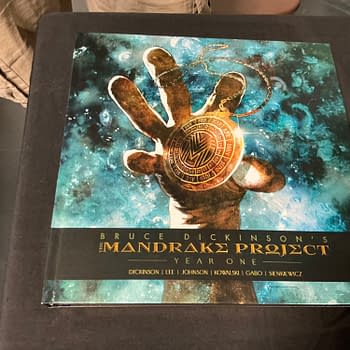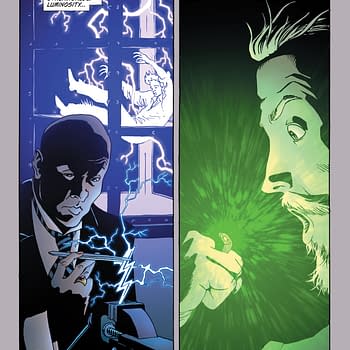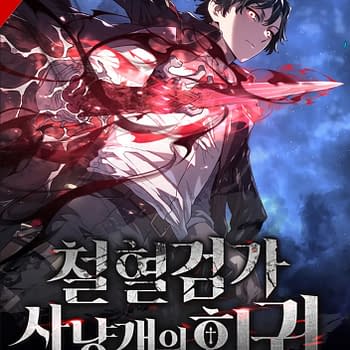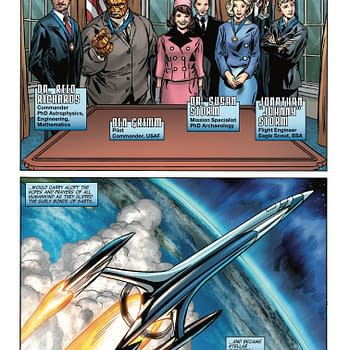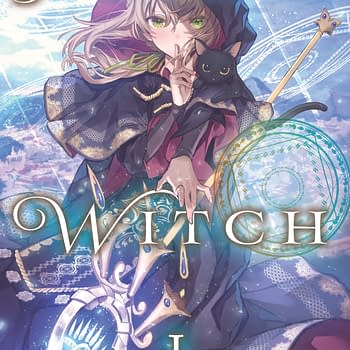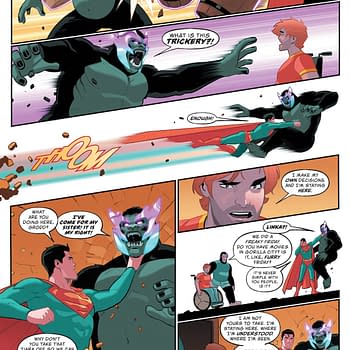Posted in: Comics | Tagged:
Superman in the Noughties – Patrick Gerard Remembers Jeph Loeb, Dan DiDio, Eddie Berganza and More
Patrick Gerard is the creator of the comic book Ungrounded, which has been featured on Bleeding Cool before.
But for a while, he was trying to get work at DC Comics.
And this week on message boards, he has been talking about his experience working at DC Comics with Superman head writer Jeph Loeb, to-be-publisher Dan DiDio, former Superman group editor Eddie Berganza. And how the noughties looked, when Jeph Loeb was writing Superman, with Superman/Batman, back in the news after censorship of that work for Walmart, the return of his TV show Agents Of SHIELD, his old Superman work being re-collected and the relaunch of a new Batman/Superman comic by Joshua Williamson and David Marquez in August.
But we begin in 2001. Republished with permission, Patrick recalls eighteen years ago.
—-
Loeb was one of DC's hotter writers at that point. He was doing a LOT of work that went above and beyond what a typical writer does although it's maybe not AS unusual for folks like Grant Morrison, Dan Slott, or Bendis. He was reviewing art portfolios and basically headhunting the whole team lineups. Kinda makes sense for the guy who had been a Hollywood producer and would later be VP of Marvel TV. (He was the publisher for a lot of Rob Liefeld's Alan Moore's Supreme and drew a lot from that.) He was all but hiring the writers and artists. It was a lot. A fair assessment would probably be that Berganza was making more of a mark on books like Young Justice and Loeb and Berganza were practically co-editing although Loeb was neither paid to do that nor could he always get final say after making a decision.
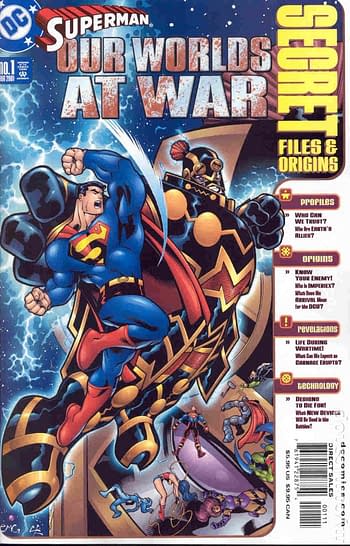
Here's what you should know about event stories — whether something is planned as an event or gets "upgraded" into one. Publishers have lists of characters they want dead or changed and a condition of doing an event is that you have to hit those marks. Often 10-20 characters the company wants to kill off. Maybe some they want to de-power. This doesn't originate with writers. If you take something like Identity Crisis, Brad Meltzer scripts the scenes and writes the dialogue and comes up with the mysteries but he's ASSIGNED to kill off Firestorm and Ray Palmer and Jack Drake and so on. Events are assigned so that you get "kill lists" and "change lists" and you have to shove those into a story that was envisioned without them or without ALL of them. Sometimes a writer can get a stay of execution by writing a character into retirement or having them just vanish. (Like Ray Palmer in Identity Crisis.)
So Our Worlds at War was a kill fest. The teams lost the readers' faith. People who never read Superman suddenly hated the Superman teams. Sales dropped. As sales dropped, the writers lost clout and had pre-approved stories axed.
DC management was also changing. More on this in a second. But the Loeb teams had a multi-year arc approved by Jennette Khan and Eddie Berganza that went out the window around the time Loeb quit [in 2002, around the same time Khan left]. They just had Luthor discover Superman's identity and were told… NO. Can't advance that plot. Have to reverse it. This threw out years worth of planning while Loeb was dealing with his kid's cancer.
So he walked. And he came back to Superman/Batman but he had a lot of demands (choosing collaborators, pay for collaborators) and was basically able to do whatever he wanted so long as DiDio didn't veto it. And that's what it reads like. This is a guy handed carte blanche. And then his son died towards the end and some drama happened and Mark Millar invited him to go to Marvel.
Underpinning a lot of this stuff is, from what I gather, Paul Levitz [then publisher and President of DC, after Jenette Kahn stepped down – Rich] was trying to choose a successor to run DC. Except what a variety of folks did or did not know was that Dan DiDio had been handpicked by somebody at Warner Bros. to take over DC before he wrote his first comic. The only reason DiDio showed up in the first place was to run the company the way WB wanted. Levitz didn't know or didn't get the full memo and was trying to find alternative candidates to weigh against DiDio. Levitz interviewed Waid. I think he talked to Loeb. Loeb and Waid always got along FAIRLY well.
But everybody who interviewed for Levitz's job had issues with DiDio. It's hard and probably unfair to assign blame on a message board post without all the facts but DiDio was trying to move into a job he'd been promised maybe 5 years before. Meanwhile, you had competing offers made to other people that upset DiDio, who spent five-plus years of his life turning down other work, planning to take that job. It became hard for some of these people to work together for awhile. So you had a big exodus from DC to Marvel of people who, I think, had awkward relationships with DiDio largely because of conflict between Levitz and Kevin Tsujihara [then Warner Bros CEO in charge of DC] and some other folks. Diane Nelson [DC publisher from 2009, pushing out Levitz – Rich] was brought in, in part, I think, because of how frayed the WB/DC relationships were so she could be a neutral party — and because she was seen as being able to expand the young girls and Young Adult markets based on her background with Harry Potter and other stuff.
On top of all of this is that I think there's a lot of folks who misread DiDio in part because, well… He's a troll. A bonafied troll. Yes, he wanted Nightwing dead for years and planned it various ways. But all the stuff about hating Nightwing was playacting. He did it because he thought it would upset the most people. He has a very soap opera/pro-wrestling view and he's more of a Silver-Age/Bronze-Age Marvel guy than DC. So he's always trying to inject that 70's Marvel "Hank Pym becomes a wifebeater" type stuff in. Because he has a view that the more comics upset or provoke people, the more they sell. Honestly, if he wants a character dead, he probably likes that character and is picking on them because he wants to stir up pitchforks and torches. He's backed off that SOME largely because outrage works differently online now. But he operates very much from kind of a Bill Jemas [then-controversial publisher of Marvel – Rich] worldview: "If you're happy with what we're doing, our sales will suffer." That's… a difficult thing for some folks IN COMICS to mesh with. Some folks just want a clean and fairly neutral status quo so they can tell clever one off stories kind of like Batman: The Animated Series.
In some ways, Loeb and DiDio got along super-well. DiDio greenlit stuff Levitz probably wouldn't have. He hired Loeb for All-Star Batman. (Frank Miller was a replacement hire. There's a first issue in a drawer somewhere of a Loeb/Art Adams All-Star Batman #1.) But he also made Loeb's job harder and kept wanting to tinker with some things in the opposite direction.
Loeb was always trying to fuse the Byrne continuity with the Silver-Age so that you'd just have one 75 year Superman continuity like what Morrison later did with Batman. DiDio wasn't keen on that and neither was Waid, exactly. Waid loves the Silver Age as a fan but he's the first guy to throw it into the woodchipper if he thinks something is silly, unrealistic, or embarrassing. (Johns shared an office with Loeb.)
The tug of war gave us Superman origin reboots about every 18 months. And Loeb more or less walked from the monthly Superman book at the start of that because he wanted a stable run.
Gerard continued talking about Loeb's talent recruitment for DC, much as how Bendis and Snyder do for DC now,
My impression was that he brought in everybody but Immonen and Mark Schultz. Those guys loved Schultz though and leaned on him as the sci-fi guy.
And looking at the current state of Superman…
DiDio's favorite modern run is probably Tomasi/Gleason.
Jurgens gained clout because of Snyder's movies. Those weren't necessarily Jurgens' tastes but they borrowed from him and the Lois/Clark relationship in those is what brought back the marriage.
DiDio is a sucker for media synergy. Loeb left to his own devices probably would have brought back Linda Lee/Kara with Tim Sale but he recognized Silver Age was a thin ice approach that might have cost him respect with editorial so he pitched it as Splash meets Terminator, drawn by Mike Turner. That's what it took to get the green light. I think shooting for a Wildstorm/J. Scott Campbell flavor also got Jim Lee onboard.
If you've noticed Loeb got the big artists and that his writing style varied (aside from the repeated mantras and Groucho Marx references), he wrote first to the artist (a big enough artist gets you a long leash) and second to the editor.
I think Ultimatum and Ultimates 3 was very much him trying to do a Millar impression that wasn't him. Like: "Oh. Mark Millar is running with incest between Wanda and Pietro? I'll push that boundary harder."
He's competitive that way. We jammed on a pitch for a Crime Syndicate thing that was supposed to take aim at JMS' Supreme Power. Ultimately, I don't want to overplay my hand as an "insider" because, welll…
Loeb wanted me writing Superman. Maggin was his mentor. [Eliot S Maggin – Rich]. He wanted me to be the next in that line.
But Eddie Berganza was always weird around me. Seemed like he was trying to act interested in hiring me but wasn't without Loeb standing over him. Matt Idelsen WAS pretty interested but he had his own stuff going on. Sent me up to DiDio who passed me off to Jann Jones.
Basically, I was never going to get in without Loeb and things were different with him after Sam died and again after he signed as a Marvel exec. Big responsibilities. A lot of his collaborators lost touch with him. Tim Sale had his own issues there. I'm glad Sam Humphries stepped up but I guess I always saw Humphries as the guy I could have been if I had my crud together faster. Took me until 2007 to get serious about self-pubbing. My roommate was murdered. Wound up being 2013 before I got into my own stuff and then my Mom died a week after the big TPB was finished.
Much respect to the guys who balance this stuff with life events.
It's not easy – thank you, Patrick.






